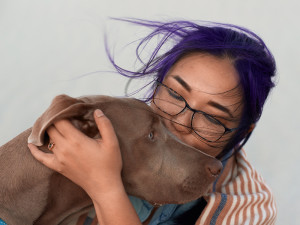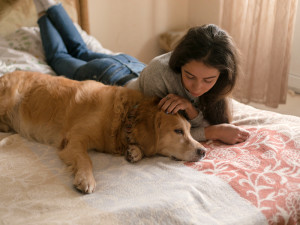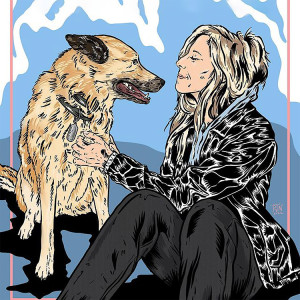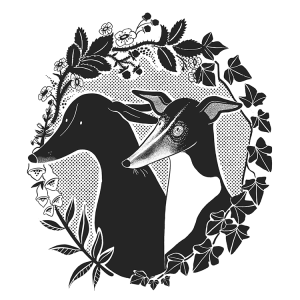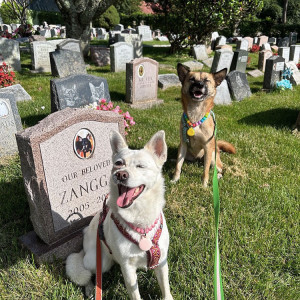10 Ways to Support a Friend Who Is Grieving a Pet
Not everyone understands how hard it is to lose a pet. You can be the person who does.

share article
For years after my beloved bunny died, she visited me in my dreams. Some of those dreams were so vivid that I would wake up in tears, or convinced she was still alive. I could feel her fur under my fingertips.
She’d been my best friend of 10 years, helping me grow through the pains of childhood and adolescence. But many people made me feel like mourning a rabbit was silly, so I hid my pain. Instead, it showed up in my dreams. The adults around me just didn’t know what to do with the little girl grieving her bunny. Today, while grieving a pet can still feel taboo, things are thankfully changing.
People just don’t get pet grief.
“When we look at the numbers, we should be having conversations about pet loss,” says Dr. Katie Lawlor, a psychologist at Bloomingdale Wellness Collectiveopens in a new tab. She explains that approximately 70 percent of U.S. households opens in a new tab have at least one pet, and 85 percent of animal guardians report loss and grief symptomsopens in a new tab comparable to the loss of a human family member.
During her doctorate program, Lawlor noticed that licensed mental health clinicians were sparsely, if at all, offering pet loss and grief support. As a pet parent herself, she took action. She launched her Instagram page, @PetLossDoctor,opens in a new tab during the COVID-19 pandemic, when she realized how many people were isolated and scared, relying heavily on their companion animals for comfort. Her private practiceopens in a new tab specializes in anticipatory grief and pet loss and is inundated with therapy and support requests. “The need is there,” Lawlor adds.
Yet, a 2021 survey by Veterinarians.orgopens in a new tab of 400 U.S. adults revealed that “72 percent of respondents reported that a member of their social circle diminished the significance of their loss with unsympathetic rhetoric (i.e., ‘It’s just a dog’).” Lawlor highlights the importance of a strong support system from people who “get it.” “If our grief is met with invalidation or apathy from the humans we love, we may experience embarrassment or despondency,” she explains. These feelings can greatly hinder someone’s ability to process grief healthily.
Being there for someone you love in their grief is important. In his book Understanding Your Grief: Ten Essential Touchstones for Finding Hope and Healing Your Heart,opens in a new tab Dr. Alan Wolfelt, a professional grief counselor and director of The Center for Loss and Life Transitionsopens in a new tab, describes a good grief companion as someone who is “walking with you on the journey, not ahead of you or behind you.”
Experts we talked to helped formulate the following tips to guide you as you show up for your grieving friend.
1. Check in with your pal.
Many of us are worried about saying the right (or wrong) thing when a loved one loses their pet. But experts agree that not saying anything at all may be even more damaging.
“If you lead from the heart, you can’t go wrong,” Lawlor says. “Even if it’s just saying something such as: ‘I don’t know what to say right now, but I want you to know that I’m here for you.’”
Rev. Marshall K. Hammeropens in a new tab, an interfaith/interspiritual minister who specializes in animal reiki and animal chaplaincy, echoes this sentiment: “I have found consistent reach-outs to be important. When a friend of mine is grieving after a loss, I reach out to let them know I'm here, thinking about them.
2. Avoid “brightside” arguments.
Kelly Cormier is a grief coach, pet loss grief specialist, and certified grief educator at Lap of Loveopens in a new tab, a U.S.-based network of veterinarians dedicated to geriatric pet care and offering in-home euthanasia. As a member of their pet loss support team, Cormier helps families navigate their grief. She warns, “Platitudes simply don’t help,” adding that as your friend’s support system, you should “avoid saying things like ‘Be grateful for the time you had’, ‘She’s in a better place now’, and the dreaded ‘Have you thought about just getting another oneopens in a new tab?’”
3. Remember their pet.
“Grieving pet parents want to know that their pet will always be remembered for who they were and the love that was shared,” Cormier adds, suggesting you could reflect on something special you noticed about your friend’s pet or the relationship.
4. Continue to check in, even after time has passed.
Continue to care for your friend around this in the weeks, months, or even years to come. Write down the pet’s birthdayopens in a new tab, adopt-a-versary, or the day of their passing, and check in with your friend on those key dates.
“If someone has a strong support network, it’s likely they’ll receive initial support but a few days later, the silence and the absence of the animal sets in. I try to text any time I am thinking about the person,” Hammer suggests.
5. Don’t expect a reply.
Sometimes, grieving people can’t reply, and that’s OK. “It doesn’t mean they aren’t grateful or appreciative for the compassion you’ve shown,” Cormier emphasizes. “They’ll reply when they can.”
6. Normalize and validate their feelings.
Grief experts insist that minimizing a grieving person’s pain can be detrimental to their grieving process. Instead, they suggest validating the feelings expressed by the bereaved — even the uncomfortable ones — and offering a safe place for them to express them.
“Speaking with fellow animal guardians, whether those we know or those we meet through our grief, can instill hope in us that there will be moments of joy again,” Lawlor says.
7. Understand that you cannot fix their grief.
“Human beings are fixers, so that is natural [to want to fix your friend’s pain], but grievers are not broken people. They’re people with broken hearts,” Cormier says. “Instead of trying to fix pain, it’s better to simply witness it. Be there. For the tears, for the stories, for the laughs while crying. That is the most meaningful companionship in grief.”
8. Offer practical support.
Both Lawlor and Cormier point out that people can be lost and overwhelmed when they are grieving. “Grief makes the most mundane tasks feel impossible,” as Lawlor puts it. For this reason, they suggest that you could offer options to your friend instead of asking broadly what they need.
“Asking [what your friend needs] puts the burden on them to articulate an answer, and grief is too exhausting to do that,” Cormier explains. Instead, she suggests taking proactive steps to support grieving pet parents, such as: bringing your friend coffee or a warm meal, helping with errands, or grocery shopping. You could also suggest a movie night, a craft night, or a walk — especially at the time your friend usually walked their dog.
9. Help your friend celebrate their pet.
More and more, grief experts highlight the importance of maintaining a connection with a deceased loved one, something that has been referred to as “continued bonds” or “presence within absence.” While some people prefer “moving on” after they lose a pet, most benefit greatly from finding ways to perpetuate the relationship.
In his book Understanding Your Grief, Wolfelt emphasizes the importance of this continued relationship through, “Precious memories, dreams reflecting the significance of the relationship, and objects that link you to the person [or pet] who died.”
You might help your friend celebrate their pet via a memorial or ritual. Lawlor suggests a few ideas: making a donation of food or supplies to an animal welfare or rescue organization in their name, creating a photo album of their pet, a painting, wind chime, candle, picture frame, or “anything you can do to show that their loss is valid and that their heartbreak is real,” she emphasizes. If crafting is not your thing, Etsy sellers opens in a new taboffer great options for creative gifts that honor pets.
10. Suggest more professional support.
If your friend’s grief is seriously affecting their life, consider suggesting they seek professional support, like grief counseling. Lap Of Love offers lots of resourcesopens in a new tab, from no-cost support groups to their Pet Loss Support Community on Facebookopens in a new tab.
Hammer suggests opens in a new tab scheduling a chat with an animal chaplainopens in a new tab. Chaplains can be secular or religious and usually offer a wide range of spiritual practices. They can be a good alternative for grieving pet parents whose religion might not recognize the importance of their companion animal.
In addition to her private practice and Instagram page, Dr. Lawlor recently published a grief journal, A Tribute to My Beloved Animal: A Journal to Process Grief & Lossopens in a new tab, which could be a thoughtful gift for your friend. Remember that there is no perfect way of doing this. Grief is a complex process, but the way you show up for your friend will be what they remember the most. Give yourself some grace, and follow your instincts. You’ve got this.
References:
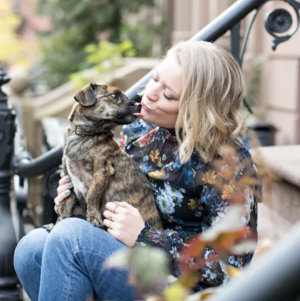
Sophie Gamand
Dog photographer. Empathetic storyteller. Tireless advocate. Sophie Gamandopens in a new tab is changing the world one camera click at a time. She travels around the world to shine a light on dogs in need. Through her social media following and photo exhibitions, she has helped find homes for hundreds of her canine muses, and raises funds for rescue organizations.
Related articles
![A black dog sitting in between two men with dog and cat illustrations hung on the wall behind them.]() opens in a new tab
opens in a new tabYour Pet Is a Masterpiece — Turn Them Into an Animalist Portrait
A rendering of your dog? Art doesn’t get finer.
![Singer Bully and her large dog named Mezzi.]() opens in a new tab
opens in a new tabBully’s Latest Album Is a Love Letter to Her Dog
How the Nashville-based artist forever captured the spirit of her best friend and “rock.”
![two black-and-white illustrated dogs]() opens in a new tab
opens in a new tabPet Cremation: How Much Does It Cost?
You never want to think about it, but it’s important to plan.
![Pet memorial Christmas tree.]() opens in a new tab
opens in a new tabA Secret Christmas Tree in Central Park Helps People Memorialize Their Pets
It’s like something out of a fairytale.
![two dogs by a grave in a pet cemetery]() opens in a new tab
opens in a new tab5 of the Most Beautiful Places in the US to Lay Your Pet to Rest
These pet cemeteries are giving animals the memorials they deserve.
![an illustration of a big black cat cradling a small person. the cat is surrounded by three pink flowers]() opens in a new tab
opens in a new tabAshes to Ashes, Pet to Plant
The founders of Pleia, a startup that practices pet composting, on this method of honoring pets after death.

